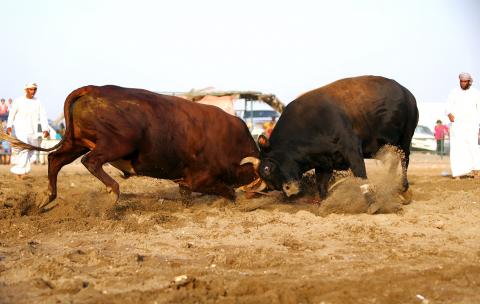There’s no matador, betting or blood when bulls lock horns in the Gulf emirate of Fujairah, but a winning beast in the popular sport can still earn its owner a fortune.
Bullfights are a weekly event at a ring close to the beach on the east coast of the United Arab Emirates.
Organizers admit the sport is rough but insist it is animal-friendly, and they ensure the bull is never killed.

Photo: AFP
While it’s believed 16th century Portuguese invaders introduced bullfighting to the Gulf, Fujairah’s version pits two bulls against one another instead of man against beast.
And unlike at bull-on-bull tournaments in Southeast Asia, spectators place no bets — Islamic tradition and Emirati laws forbid it.
A fight lasts just minutes, ending when one of the bulls gives up or is pushed back by its rival to the roar of a commentator’s voice over loudspeakers.
Upon his word, more than a dozen barefooted handlers use ropes to pull the bulls apart before the next bout kicks off.
“Dr Thomas and Jackson,” says the commentator, introducing the next pair of animals to lock horns.
As the two bulls square off, an alarm pierces the air. Known as Al-wannan, the sound is intended as a form of applause to heighten the excitement.
Despite soaring temperatures, local families and tourists gather around the fenced bull-ring. Some sit atop SUVs, cracking seeds and sipping juice.
Around 80 bulls take part in the hours-long contest. The winning bull in each round is decided by a committee of judges formed of eight local elders.
There are no cash prizes for the owners.
But the value of a winning bull can shoot up in price, attracting offers by traders, some of whom drive in from nearby Oman where the sport is even more popular.
“When a bull is always distinct, winning against other bulls, its price can reach 600,000 dirhams (US$163,000),” said Hamad al-Matrushi, an elderly committee member and bull-owner.
“But the price of a bull which sometimes performs well and other times not so well would go down to around 120,000 (US$32,700) or 80,000 dirhams (US$21,800),” he said.
‘MERCIFUL TRADITION’
This form of bullfighting, known in Arabic as munatahat al-thiran (bull-butting), has its own set of traditions.
The brightly-coloured traje de luces (suit of lights) clothing that distinguishes Spanish matadors is replaced by the traditional white robe worn by Bedouins, known locally as the dishdasha.
Twelve-year-old Swati, an Indian girl who came with her family from the modern city-state of Dubai, was expecting to see a matador waving a red cape.
“But when I came here, my father told me that it’s actually two bulls fighting,” she said.
Matrushi pointed to another difference with the Spanish version.
“There, they could mistreat the animal or torture it. Here we are merciful towards it. We provide it with medical treatment, we take care of it and feed it properly.”
Mohammed Abdullah, a 30-year-old government employee who himself owns 15 bulls, agreed.
“We give them food and nourishment from the best types of proteins and vitamins,” he said. He estimated that feeding his bulls costs him 10,000 dirhams (US$2,700) a month.
There is no system of weight classes for the bulls, which can fight from the age of two until they retire to the fields or are given away as gifts.
The Jersey and Holstein breeds are the most popular.
Fujairah’s champion is named Reyla, a massive black hulk of flesh. It always wins, attracting fans who cross the border from Oman to watch it fight.
“It comes with its own audience,” said Abdullah. The owner has been offered 300,000 dirhams (US$81,700) in cash and still refuses to sell.
‘BARBARISM’
From an early age, owners can tell if a calf will grow up to be successful in the ring.
Potential fighters are trained by walking them in the sea to strengthen the legs, before they are taken to the mountains to build up chest muscles. Matrushi said a farmer can often “provide the bulls with more attention than he gives to his own children.”
But Mimi Bekhechi, director of the animal rights organization PETA UK, remains unimpressed.
“This ridiculous and inhumane form of human entertainment can only be distressing to bulls, who will be agitated by the noise of the crowd and from being manhandled,” she told AFP.
“These days, we should be past such barbarism,” Bekhechi said.
Ethiopian tourist Kidani agreed. “It’s not right, because they hurt each other,” he said.
The organizers “make the animals very angry.”
The nearby bulls bellowed and snorted, dragging their hooves in the sand. As the sun set, they were dragged into pick-ups and driven back to nearby farms.

The Taipei Times last week reported that the rising share of seniors in the population is reshaping the nation’s housing markets. According to data from the Ministry of the Interior, about 850,000 residences were occupied by elderly people in the first quarter, including 655,000 that housed only one resident. H&B Realty chief researcher Jessica Hsu (徐佳馨), quoted in the article, said that there is rising demand for elderly-friendly housing, including units with elevators, barrier-free layouts and proximity to healthcare services. Hsu and others cited in the article highlighted the changing family residential dynamics, as children no longer live with parents,

It is jarring how differently Taiwan’s politics is portrayed in the international press compared to the local Chinese-language press. Viewed from abroad, Taiwan is seen as a geopolitical hotspot, or “The Most Dangerous Place on Earth,” as the Economist once blazoned across their cover. Meanwhile, tasked with facing down those existential threats, Taiwan’s leaders are dying their hair pink. These include former president Tsai Ing-wen (蔡英文), Vice President Hsiao Bi-khim (蕭美琴) and Kaohsiung Mayor Chen Chi-mai (陳其邁), among others. They are demonstrating what big fans they are of South Korean K-pop sensations Blackpink ahead of their concerts this weekend in Kaohsiung.

Oct 20 to Oct 26 After a day of fighting, the Japanese Army’s Second Division was resting when a curious delegation of two Scotsmen and 19 Taiwanese approached their camp. It was Oct. 20, 1895, and the troops had reached Taiye Village (太爺庄) in today’s Hunei District (湖內), Kaohsiung, just 10km away from their final target of Tainan. Led by Presbyterian missionaries Thomas Barclay and Duncan Ferguson, the group informed the Japanese that resistance leader Liu Yung-fu (劉永福) had fled to China the previous night, leaving his Black Flag Army fighters behind and the city in chaos. On behalf of the

I was 10 when I read an article in the local paper about the Air Guitar World Championships, which take place every year in my home town of Oulu, Finland. My parents had helped out at the very first contest back in 1996 — my mum gave out fliers, my dad sorted the music. Since then, national championships have been held all across the world, with the winners assembling in Oulu every summer. At the time, I asked my parents if I could compete. At first they were hesitant; the event was in a bar, and there would be a lot